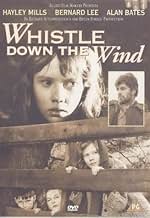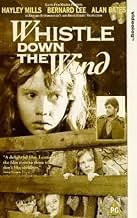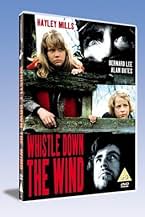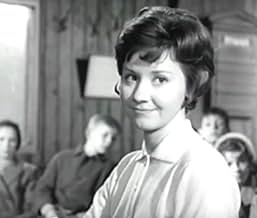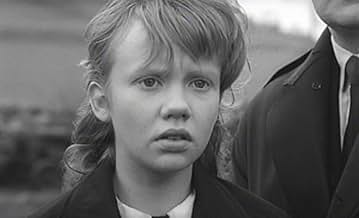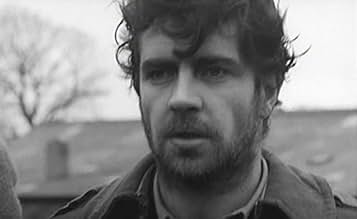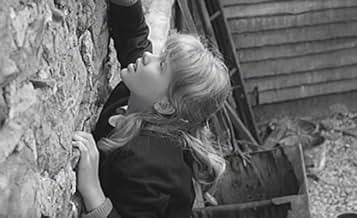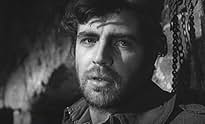IMDb RATING
7.6/10
4K
YOUR RATING
When an injured wife murderer takes refuge on a remote Lancashire farm, the owner's three children mistakenly believe him to be the Second Coming of Christ.When an injured wife murderer takes refuge on a remote Lancashire farm, the owner's three children mistakenly believe him to be the Second Coming of Christ.When an injured wife murderer takes refuge on a remote Lancashire farm, the owner's three children mistakenly believe him to be the Second Coming of Christ.
- Director
- Writers
- Stars
- Nominated for 4 BAFTA Awards
- 1 win & 5 nominations total
- Director
- Writers
- All cast & crew
- Production, box office & more at IMDbPro
Featured reviews
Produced by Sir Richard Attenborough (Jurassic Park), and written by Lady Mills (wife of Sir John, a veteran British actor), this is a charming look at childhood, through the eyes of three children, in the early 60`s. An injured, escaped murderer seeks refuge in their barn (Alan Bates), the kids find him, and believe hes Jesus...(when they ask who he is, he mutters `Jesus Christ!`). The script is so innocent, we were these children not so long ago, theres a little of them in all of us.. Hayley Mills (daughter of Sir John Mills, and the star of many Disney movies), stars as Cathy, the eldest of the kids, barely in her teens. Bernard Lee (`M` in countless James Bond movies), plays the father of the family... What makes it so good, is the way the kids converse with each other, their innocence of thinking that a holy figure has come to live in their barn, of all places!! It doesn`t mean to be funny, but it is. Its all too light hearted to be anything else..Just a wonderful, very little known movie.
Whistle Down the Wind has remained one of my favourite films ever since I saw it as a young child many years ago when my parents took me to see it when it was originally released. The performances by all the children in the film are charming and Alan Bates excels as the criminal who is mistaken for Jesus. For me, the special aspects of the film are its genuine innocence and the capturing of a much simpler time in England that will never return. I myself was born and grew up in the north in an area similar to the one shown in the film and today, now aged 48, watch the film with great nostalgia and a warm feeling about my carefree life as a child. I also feel sadness that many children in our country today cannot enjoy the freedom to roam and play far and wide as I (and the children in the film) could do at that time. I have never met anyone who didn't enjoy this underrated classic and defy anyone not to be moved by the naturalness of the performances. A marvelous addition to anyone's DVD collection and one that I treasure.
Once in a while you come across a film that is perfect - and this film is one of them. It has everything - humour, pathos, skilled acting, beautiful cinematography and it deals with the deepest questions of human existence. I found myself alternating between laughter and tears. It seems to touch on deep themes which films rarely dare to nowadays - themes of belief, faith, and the meaning of love.
The photography of the bleak Lancashire countryside is superbly crisp, the facial expressions of the actors (especially Mr Bates) let us know exactly what is going on in their minds but subtly, in a way that is never seen nowadays in films where everything must be made explicit.The children interact entirely naturally and they are not merely credulous, but curious and questioning ('he's not Jesus, he's just some fella'). Some scenes are deeply moving, in particular when the children dance under a tree to the music of 'We Three Kings' in joy and praise at seeing what they believe to be their Saviour - seeming to sum up the deep, almost pagan connection between religion and the English countryside.
The film deftly deals with the changing England of the time. By the early sixties, mainstream Christianity had begun to lose its hold on the English people (this was the time of Bishop Robinson and the 'Honest to God' debate); the decaying, plundered church is representative of the decline in organised religion, juxtaposed with the 'true' faith of the children. The religious figures, however, are not pilloried as would be the case in most modern films - they are treated sympathetically. I particularly liked the look of awkwardness on the Sunday school teacher's face when she is asked a question about Jesus which she knows she cannot answer with any honesty, and which she clumsily sidesteps.
In many ways the film is an elegy for a lost England - an England where children roam the countryside freely, where the nearest telephone is half a mile away, and where children live in relative material poverty but with strong familial love, where the simple pleasures of life are enjoyed - playing in the open air, having a birthday party at home, or reading late into the night. The film could not realistically have been made even just ten years later.
The photography of the bleak Lancashire countryside is superbly crisp, the facial expressions of the actors (especially Mr Bates) let us know exactly what is going on in their minds but subtly, in a way that is never seen nowadays in films where everything must be made explicit.The children interact entirely naturally and they are not merely credulous, but curious and questioning ('he's not Jesus, he's just some fella'). Some scenes are deeply moving, in particular when the children dance under a tree to the music of 'We Three Kings' in joy and praise at seeing what they believe to be their Saviour - seeming to sum up the deep, almost pagan connection between religion and the English countryside.
The film deftly deals with the changing England of the time. By the early sixties, mainstream Christianity had begun to lose its hold on the English people (this was the time of Bishop Robinson and the 'Honest to God' debate); the decaying, plundered church is representative of the decline in organised religion, juxtaposed with the 'true' faith of the children. The religious figures, however, are not pilloried as would be the case in most modern films - they are treated sympathetically. I particularly liked the look of awkwardness on the Sunday school teacher's face when she is asked a question about Jesus which she knows she cannot answer with any honesty, and which she clumsily sidesteps.
In many ways the film is an elegy for a lost England - an England where children roam the countryside freely, where the nearest telephone is half a mile away, and where children live in relative material poverty but with strong familial love, where the simple pleasures of life are enjoyed - playing in the open air, having a birthday party at home, or reading late into the night. The film could not realistically have been made even just ten years later.
One of my favourite english films. Beautifully portraying rural Lancashire life in the sixties. The story is touching and marvellously played by all the children involved. One of the few films that can bring a tear to my eye, maybe because it reminds me of the child I once was in the sixties, but probably because it is a moving film and I suspect it would have the same affect on a native New Yorker. One of those old classics that if you haven't seen yet, you will be pleasantly surprised when you get round to it. You can take it as recommended!
Adolescent English farm-girl discovers an escaped, bearded convict sleeping in the family barn and thinks he's Jesus. Young Kathy needs to believe this, even after the police come to cart him away. He even drops a picture of the Savior, which seems to symbolize not only the prisoner's fall from grace but one more sign for Kathy that, yes, this mysterious man might be Him. "Whistle Down the Wind" is a hard-shelled movie that says we lose hope and faith as we mature--which isn't an original idea for a film, but the cynical way this is presented catches you off-guard. One little boy numbers the eggs he has has eaten (a mixture of his bemusement and his feeling of monotony), one little girl vows to keep counting until Kathy comes out of the barn. These children need to believe too, of course, but they're much more raw than Kathy; they strip ideas down to the basics. Kathy believes blindly. It's a touching character, the centerpiece of the film, and I was enchanted by Hayley Mills' open face and yearning smile. The other youngsters are also remarkable. If the film doesn't offer us fanciful answers, it does provide playful bits of visual humor. Even the rhythm of the kids' words is comical (and the way they relate to one another seems very natural). The film gives away nothing without an eternal struggle, and at the end there is no clear answer. I believe the next day would become routine for the children, they would go back to their basics. But Kathy has changed, and the convict has as well. Their lives intersected for a moment, and, though others became involved, they both learned something from the other about the need to believe. ***1/2 from ****
Did you know
- TriviaThe title "Whistle Down the Wind" originally comes from falconry and means "to let a falcon fly away free."
- GoofsIn several scenes, but especially when the children are in the barn discussing a name for the cats, the youngest boy can be seen mouthing the other characters lines before he says his own.
- Quotes
Charlie Bostock: It isn't Jesus. It's just a fella.
- Crazy creditsThe character played by Alan Bates is named Arthur Alan Blakey in the movie, but in the credits he is listed as "The Man."
- ConnectionsFeatured in Blue Peter: Episode #4.32 (1961)
- SoundtracksWe Three Kings
(uncredited)
Words and Music by John H. Hopkins (as Reverend John Henry Hopkins,, Jr.)
Incorporated into incidental music
- How long is Whistle Down the Wind?Powered by Alexa
Details
Box office
- Budget
- £148,000 (estimated)
- Runtime1 hour 39 minutes
- Color
- Aspect ratio
- 1.66 : 1
Contribute to this page
Suggest an edit or add missing content

Top Gap
By what name was Le vent garde son secret (1961) officially released in India in English?
Answer
